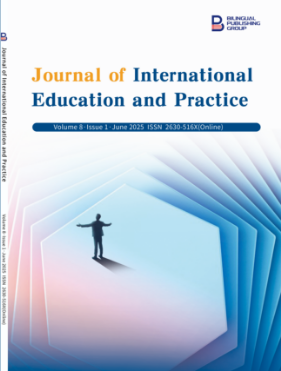From Virtual Exchange to Local Action: Advancing Global Citizenship Education through Transnational Telecollaborative Projects in Latin America
DOI:
https://doi.org/10.30564/jiep.v8i1.11458Abstract
This study investigates how transnational telecollaborative projects can advance Global Citizenship Education (GCE) in Latin American secondary schools by linking virtual exchange with locally grounded civic action. Using a mixed-methods case study design, the research examines two projects developed through a six-week teacher training program in Argentina, implemented with partner schools in Peru and Mexico. Data were collected through pre- and post-project surveys, teacher reflections, student-created digital artifacts, and reflective discussions, and analyzed using descriptive statistics and thematic coding guided by UNESCO’s GCE competency framework, with triangulation across sources to ensure reliability. Findings indicate that in the inequality project (Argentina–Peru), 87% of students reported increased awareness of how discrimination operates across cultural contexts, while 91% expressed stronger commitment to ethical digital behavior. In the climate action project (Argentina–Mexico), 73% of participants adopted new sustainability practices and reported greater confidence using English for authentic intercultural communication. Across both initiatives, 85% of students indicated feeling more responsible for contributing to social or environmental change, while teachers reported professional growth in digital pedagogy, project-based learning, and intercultural facilitation. The results highlight the transformative potential of transnational telecollaboration in developing the cognitive, socio-emotional, and behavioral competencies essential to Global Citizenship Education (GCE). They also show that low-cost, technology-enabled models can overcome barriers to traditional exchange and offer scalable, inclusive strategies for action-oriented global learning in underrepresented contexts.
Keywords:
Transnational Telecollaboration; Global Citizenship Education (GCE); Latin America; SDGs; Teacher Training; Intercultural LearningReferences
[1] UNESCO, 2015. Global citizenship education: topics and learning objectives. UNESCO: Paris, France. pp. 13-16, 21-58. DOI: https://doi.org/10.54675/DRHC3544
[2] Remesal, A., Villarroel, V., 2023. Challenges for post-pandemic virtual education in Latin America: A comparative analysis of the emergency remote higher education process in Chile, Mexico, and Ecuador. Sustainability, 15(19), 14199. DOI: https://doi.org/10.3390/su151914199
[3] Toscu, S., 2023. A Review of Research on Telecollaboration in English as a Foreign and Second Language Learning Contexts. In: Di Sarno-García, S., Montaner-Villalba, S., Gimeno-Sanz, A.M. (eds.). Advances in Educational Technologies and Instructional Design. IGI Global: Hershey, PA, USA. pp. 1–22. DOI: https://doi.org/10.4018/978-1-6684-7080-0.ch001
[4] Gui, Y., Kew, S.N., 2025. Leveraging Telecollaboration and Virtual Mobility to Enhance Intercultural Communicative Competence in English Language Teaching Classrooms in China. Journal of Information Systems Engineering and Management. 10(54s), 622–633. DOI: https://doi.org/10.52783/jisem.v10i54s.11147
[5] O’Rourke, B., 2007. Chapter 3. Models of Telecollaboration (1): eTandem. In: O’Dowd, R. (ed.). Online Intercultural Exchange. Multilingual Matters: Bristol, UK. pp. 41–61. DOI: https://doi.org/10.21832/9781847690104-005
[6] Sadler, R., Dooly, M., 2022. Telecollaboration. In N. Ziegler & M. González-Lloret (Eds.), The Routledge Handbook of Second Language Acquisition and Technology. Routledge: London, UK. pp. 245–257.
[7] O’Dowd, R., 2018. From telecollaboration to virtual exchange: state-of-the-art and the role of UNICollaboration in moving forward. Journal of virtual exchange. 1, 1–23. DOI:https://doi.org/10.14705/rpnet.2018.jve.1
[8] O’Dowd, R., 2020. A transnational model of virtual exchange for global citizenship education. Language Teaching. 53(4), 477–490. DOI:https://doi.org/10.1017/S0261444819000077
[9] Giralt, M., Murray, L., Benini, S., 2022. Global citizenship and virtual exchange practices: Promoting critical digital literacies and intercultural competence in language education. In: Lütge, C., Merse, T., Rauschert, P. (eds.). Global citizenship in foreign language education: Concepts, practices, connections. Routledge: London, UK. pp. 151–173. DOI:https://doi.org/10.4324/9781003183839-10.
[10] Byram, M., 1997. Teaching and assessing intercultural communicative competence. Multilingual Matters: Bristol, UK. pp. 31-55.
[11] Mezirow, J., 2000. Learning as transformation: Critical perspectives on a theory in progress, 1st ed. Jossey-Bass: San Francisco, CA , USA. pp. 3-125.
[12] Nussbaum, M.C., 1997. Cultivating Humanity: A Classical Defense of Reform in Liberal Education. Harvard University Press: Cambridge, MA, USA. pp. 1-40. DOI: https://doi.org/10.2307/j.ctvjghth8
[13] Altinay, H., 2011. Global civics: Responsibilities and rights in an interdependent world. Brookings Institution Press: Washington, DC, USA. pp. 1-7.
[14] Martínez Sainz, G., Barry, M., 2020. Digital Technologies to Advance Global Citizenship Education in Schools.
[15] Harris, J., 1997. Content and intent shape function: Designs for web-based educational telecomputing activities. W&M ScholarWorks: Williamsburg, VA, USA. pp. 19-20.
[16] Harris, J., 1998. Virtual architecture: Designing and directing curriculum-based telecomputing. International Society for Technology in Education (ISTE). Available from: https://scholarworks.wm.edu/items/83aac340-44f4-403f-86fb-288925bfc192 (cited April 2 2025)
[17] Carnicero Sanguinetti, S., 2023. Project-Based Learning: Research, Creation, and Collaboration Mediated by Technology. Novedades Educativas: Buenos Aires, Argentina. pp. 37-51 (in Spanish)
[18] Falasca, M., Carnicero, S., 2024. Developing global citizenship through transnational telecollaborative projects in K-12 education. In: Falasca, M., Baum, K.J. (eds.). Current Trends in Global Education: Bridging K-12 and Higher Education for an Interconnected World. Star Scholars Press: Baltimore, MD, USA. pp. 92-107.
[19] De Luca, N., 2023. Virtual exchanges in teacher training. State of the art and challenges for language teaching. Bellaterra Journal of Teaching & Learning Language & Literature, 16(4), e1207. DOI:https://doi.org/10.5565/rev/jtl3.1207
[20] Leite, S., 2022. Using the SDGs for global citizenship education: definitions, challenges, and opportunities. Globalisation, Societies and Education. 20(3), 401–413. DOI: https://doi.org/10.1080/14767724.2021.1882957
[21] Creswell, J. W., Plano Clark, V. L., 2018. Designing and conducting mixed methods research, 3rd ed. SAGE Publications: Thousand Oaks, CA, USA.
[22] Yin, R. K., 2018. Case study research and applications: Design and methods, 6th ed. Sage: Thousand Oaks, CA, USA. pp. 3-209.
[23] Stake, R. E., 1995. The art of case study research. Sage: Thousand Oaks, CA, USA. pp. 1-14, 49-68, 71-86. DOI: https://doi.org/10.54675/DRHC3544
[24] Saldaña, J., 2021. The coding manual for qualitative researchers, 4th ed. Sage: London, UK. pp. 1-56.
[25] British Educational Research Association, 2018. Ethical guidelines for educational research, 4th ed. British Educational Research Association: London, UK. Available from: https://www.bera.ac.uk/publication/ethical-guidelines-for-educational-research-2018 (cited 6 April 2025)
Downloads
How to Cite
Issue
Article Type
License
Copyright © 2025 Marina Falasca

This is an open access article under the Creative Commons Attribution-NonCommercial 4.0 International (CC BY-NC 4.0) License.




 Marina Falasca
Marina Falasca


